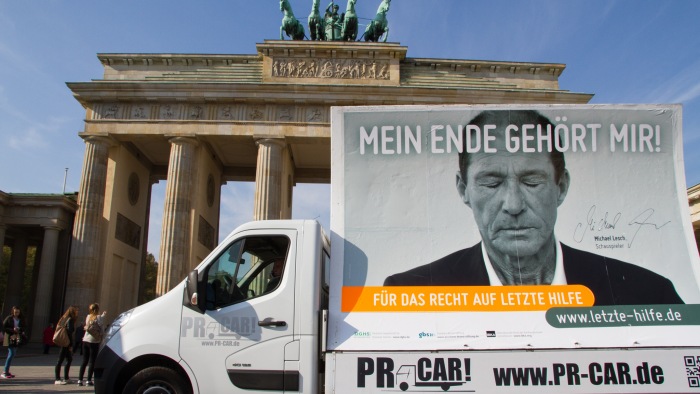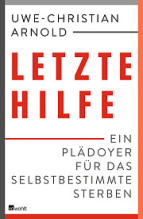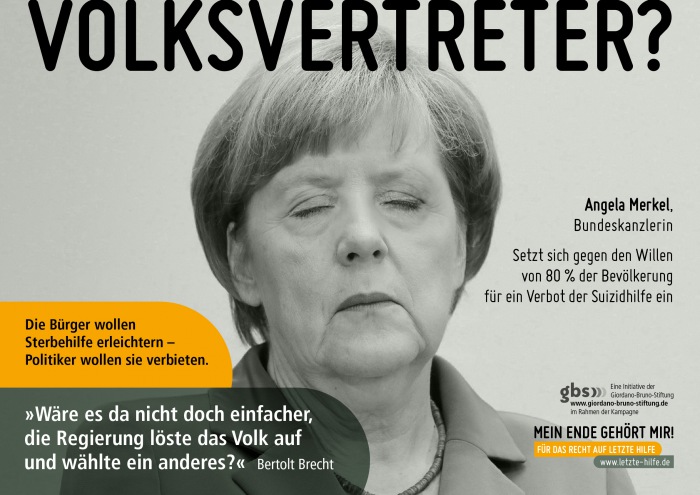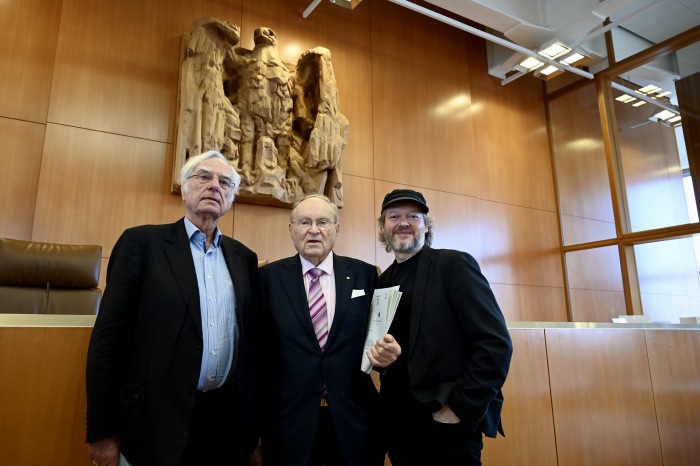The Tough Fight for Self-Determination at the End of Life
Review of a successful campaign

letztehilfe_berlin2.jpg
Foto: Evelin Frerk
For more than six years, the Giordano Bruno Foundation and its cooperation partners have fought for the "Right to Last Aid". With the ruling of the Federal Constitutional Court on Wednesday, which declared the controversial section 217 of the German Penal Code unconstitutional, an important milestone has now been reached. A welcome occasion to look back on the campaign's main stages.
The campaign "My End Belongs to Me - For the Right to Last Aid" was launched in October 2014, but even long before that the Giordano Bruno Foundation had already been intensively engaged in the debate about self-determination at the end of life. In 2009, a strategy meeting with Dignitas Switzerland and Dignitas Germany had already taken place at the former gbs foundation headquarters in Mastershausen, attended by Uwe-Christian Arnold and Ludwig A. Minelli, among others, who assisted the dying and later became gbs advisory board members. In April 2013, Uwe-Christian Arnold then gave a first public lecture on "The Right to Last Aid" at the new gbs foundation headquarters in Oberwesel. Even then it was rumoured that church-related members of the Bundestag were preparing a law banning medical suicide assistance.
These concerns were confirmed in January 2014 when the then Federal Minister of Health Hermann Gröhe (CDU) announced that he intended to criminalize medically assisted suicide. The gbs immediately subjected his statements to harsh criticism. Two months later, Ingrid Matthäus-Maier, former SPD top politician, gbs advisory board member, and spokeswoman of the "Bünd  nis für Selbstbestimmung bis zum Lebensende" (Alliance for Self-Determination until the End of Life, comprised of gbs, DGHS, IBKA, HVD, HU, DfW, bfg Bayern) presented guidelines for humane suicide assistance at the House of the Federal Press Conference. At about the same time, Uwe-Christian Arnold and Michael Schmidt-Salomon began working on their book "Letzte Hilfe - Ein Plädoyer für das selbstbestimmeter Sterben" (Last Help - A Plea for Self-Determined Dying), which was published by Rowohlt-Verlag in October 2014 and sent to all members of the Bundestag, so that later none of them could claim that he or she "knew nothing about this".
nis für Selbstbestimmung bis zum Lebensende" (Alliance for Self-Determination until the End of Life, comprised of gbs, DGHS, IBKA, HVD, HU, DfW, bfg Bayern) presented guidelines for humane suicide assistance at the House of the Federal Press Conference. At about the same time, Uwe-Christian Arnold and Michael Schmidt-Salomon began working on their book "Letzte Hilfe - Ein Plädoyer für das selbstbestimmeter Sterben" (Last Help - A Plea for Self-Determined Dying), which was published by Rowohlt-Verlag in October 2014 and sent to all members of the Bundestag, so that later none of them could claim that he or she "knew nothing about this".
The campaign for the Right to Last Aid

The "Last Aid" book was presented on October 10 together with the "Kampagne ür das Recht auf Letzte Hilfe" ("Campaign for the Right to Last Aid" )by the gbs, DGHS, and ICEFA at the House of the Federal Press Conference. The campaign attracted attention not only because of its many prominent supporters (including singer-songwriter Konstantin Wecker, writer Ralph Giordano, comedian Bernhard Hoëcker, or the actresses Eva Mattes and Petra Nadolny), whom gbs photographer Evelin Frerk photographed with their eyes closed for the large posters, but also by the tragic news of the suicide of former MDR director Udo Reiter, who was found dead as a prominent supporter of the campaign at the time of the Berlin press conference, which propelled the campaign to the front page of the BILD tabloid and prompted an ARD special broadcast with Günther Jauch and Thomas Gottschalk.
In the months that followed, Ingrid Matthäus-Maier, Uwe-Christian Arnold, Ludwig A. Minelli, and Michael Schmidt-Salomon, in particular, attended numerous media events to promote the right to self-determination at the end of life. Their arguments were well received by the general public, but they fell on deaf ears in the political establishment. This did not change when in April 2014 the renowned law professor and gbs advisory board member Eric Hilgendorf brought together 135 initially, and later even 150 German criminal law teachers for a joint "resolution against the criminalisation of assisted suicide". In their unprecedented initiative, the law professors made it clear that the planned ban on competent assisted suicide accompaniment violated all principles of the German legal system. This did not succeed (at first): the majority of German parliamentarians proved to be highly resistant to consultation.
Dhe Death Plumber
 The officials of the medical profession, above all the then President of Doctors Montgomery, also refused to recognize the "Right to Last Aid". The gbs reacted to this blocking attitude with the art action campaign "Lassen Sie das doch den Klempner machen") ("Let the plumber do it!" - Montgomery's answer to the question who should help critically ill people if medical doctors were not permitted to perform this task). The project with the oversized "Sterbe-Klempner" ("Death Plumber") caused broad discussions at the opening of the German Doctors' Day in May 2015 and put the president of the medical profession in a rather difficult position. At the same time, Uwe-Christian Arnold (with the support of the gbs and DGHS) published an "Open Letter from 180 Doctors", who fought against Montgomery's illiberal activities with clear words.
The officials of the medical profession, above all the then President of Doctors Montgomery, also refused to recognize the "Right to Last Aid". The gbs reacted to this blocking attitude with the art action campaign "Lassen Sie das doch den Klempner machen") ("Let the plumber do it!" - Montgomery's answer to the question who should help critically ill people if medical doctors were not permitted to perform this task). The project with the oversized "Sterbe-Klempner" ("Death Plumber") caused broad discussions at the opening of the German Doctors' Day in May 2015 and put the president of the medical profession in a rather difficult position. At the same time, Uwe-Christian Arnold (with the support of the gbs and DGHS) published an "Open Letter from 180 Doctors", who fought against Montgomery's illiberal activities with clear words.
In June 2015 it was clear that the majority of members of the Bundestag were completely deaf to rational arguments, which is why the gbs decided to take a tougher approach. And so in October 2015 the foundation launched the campaign "Wäre es da denn denn einfacher, die Regierung auf dem Volk auf dem Volk und wählen ein anderes?" (Would it not in that case be simpler for the government to dissolve the people and elect another?), which revealed that the parliamentary debate on assisted dying was a "prime example of Christian lobbying" in the "Church Republic of Germany" (Carsten Frerk).
 On November 6, 2015, the day of the vote on the new law in the German Bundestag, the gbs commented on the adoption of section 217 of the German Penal Code under the title "Dieses Gesetz wird vor Gericht keinen Bestand haben!" ("This law won't hold up in court," a prediction that fortunately proved true eventually). "This law won't hold up in court," a prediction that fortunately proved true eventually. Following the publication of the "Law on the Criminal Liability of Business-like Promotion of Suicide" in the Federal Law Gazette on December 9, 2015, the gbs published on its website the names of all parliamentarians who had voted for the unconstitutional "Euthanasia Prevention Act". The title of the article undoubtedly infuriated some members of the German Bundestag, but unfortunately reflected the truth: "Diese Politiker sind verantwortlich dafür, dass Sie möglicherweise qualvoll sterben müssen!" ("These politicians are responsible for the fact that you may have to die in agony!")
On November 6, 2015, the day of the vote on the new law in the German Bundestag, the gbs commented on the adoption of section 217 of the German Penal Code under the title "Dieses Gesetz wird vor Gericht keinen Bestand haben!" ("This law won't hold up in court," a prediction that fortunately proved true eventually). "This law won't hold up in court," a prediction that fortunately proved true eventually. Following the publication of the "Law on the Criminal Liability of Business-like Promotion of Suicide" in the Federal Law Gazette on December 9, 2015, the gbs published on its website the names of all parliamentarians who had voted for the unconstitutional "Euthanasia Prevention Act". The title of the article undoubtedly infuriated some members of the German Bundestag, but unfortunately reflected the truth: "Diese Politiker sind verantwortlich dafür, dass Sie möglicherweise qualvoll sterben müssen!" ("These politicians are responsible for the fact that you may have to die in agony!")
"This law will not hold up in court!"
 In the following months, the gbs dealt intensively with the various constitutional complaints against section 217 of the German Penal Code. In September 2016, the foundation submitted a first statement to the Federal Constitutional Court, drafted by gbs spokesman Michael Schmidt-Salomon, which explained in detail that section 217 StGB violates the dignity and autonomy of citizens and de facto deprives them of their "last human right", namely the right to a dignified suicide. This was followed in February 2017 by a second statement by ifw director Jacqueline Neumann, who explained why section 217 StGB could not be interpreted in conformity with the constitution and therefore had to be declared void. (In its ruling of February 26, 2020, the Federal Constitutional Court followed the central arguments of both gbs statements).
In the following months, the gbs dealt intensively with the various constitutional complaints against section 217 of the German Penal Code. In September 2016, the foundation submitted a first statement to the Federal Constitutional Court, drafted by gbs spokesman Michael Schmidt-Salomon, which explained in detail that section 217 StGB violates the dignity and autonomy of citizens and de facto deprives them of their "last human right", namely the right to a dignified suicide. This was followed in February 2017 by a second statement by ifw director Jacqueline Neumann, who explained why section 217 StGB could not be interpreted in conformity with the constitution and therefore had to be declared void. (In its ruling of February 26, 2020, the Federal Constitutional Court followed the central arguments of both gbs statements).
At the oral hearing on the constitutional complaints in April 2019 in Karlsruhe, no less than three gbs members were present: Michael Schmidt-Salomon as "expert third party", Ludwig A. Minelli as complainant for Dignitas, and Jacqueline Neumann as trial observer. A fourth gbs member was tragically absent: gbs advisory board member Uwe-Christian Arnold had taken his own life a few days before the court date due to his advanced cancer. His last statement, written the day before his death, was read out by his lawyer Robert Roßbruch (Vice President of the DGHS and ifw advisory board member) at the beginning of the hearing in Karlsruhe.
In his ten-minute statement before the court, Michael Schmidt-Salomon once again emphasized what he considered to be the decisive point of the debate, i. e. the inviolable dignity and the associated rights of self-determination of the individual, a point he already made unmistakably clear in his opening sentence: "The dignity of the individual is determined by the fact that the individual determines their dignity - not the state or the church." After the two day hearing he described the proceedings as a "stellar moment for the Federal Constitutional Court" - and the high expectations towards the court were by no means disappointed at the rendition of judgement on Ash Wednesday 2020, but even exceeded.
An important stage win
 Immediately following the "historic ruling" of the Federal Constitutional Court, the gbs organized a debriefing with numerous complainants, medical doctors, and representatives of assisted dying organizations at the Schlosshotel Karlsruhe. All those present agreed that the Federal Constitutional Court had widely opened the gates for a free, humane culture of dying in Germany, but that the opponents of self-determined dying would now leave no stone unturned in order to close the door to freedom for citizens again. The annulment of section 217 StGB, which was unconstitutional from the outset, was therefore only a first, albeit enormously important, stage victory. Now, however, the course must be set to ensure that the "Right to Last Aid" can in fact be realized.
Immediately following the "historic ruling" of the Federal Constitutional Court, the gbs organized a debriefing with numerous complainants, medical doctors, and representatives of assisted dying organizations at the Schlosshotel Karlsruhe. All those present agreed that the Federal Constitutional Court had widely opened the gates for a free, humane culture of dying in Germany, but that the opponents of self-determined dying would now leave no stone unturned in order to close the door to freedom for citizens again. The annulment of section 217 StGB, which was unconstitutional from the outset, was therefore only a first, albeit enormously important, stage victory. Now, however, the course must be set to ensure that the "Right to Last Aid" can in fact be realized.
In Karlsruhe, many key figures for self-determination at the end of life have agreed to work closely together to achieve this goal. A further strategy meeting will be held at the gbs foundation headquarters in Oberwesel on March 21 in the lead-up to a "commemoration event for Uwe-Christian Arnold". Let us note: the campaign for the Right to Last Aid has achieved far more than many notorious pessimists had expected, but we are still a long way from the actual goal, the realization of an "Ars moriendi", a truly humane and liberal culture in which every human being can die the way they want to die. The struggle for self-determination at the end of life continues...
